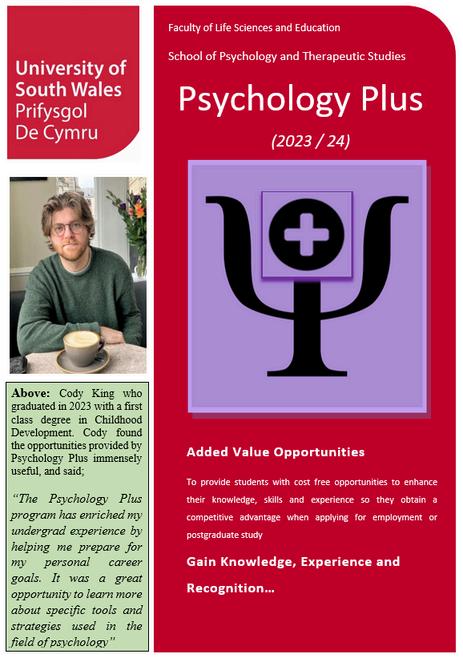




Sulci
The University of South Wales Psychology Department's studentled magazine
Contacts
Editor in Chief
Jordan Lewis-Iles 30017002
Second Editor in Chief Faith McLachlan 30019211
Psychology Plus coordinator Philp Tyson philip.tyson@southwales ac uk






Sulci
The University of South Wales Psychology Department's studentled magazine
Contacts
Editor in Chief
Jordan Lewis-Iles 30017002
Second Editor in Chief Faith McLachlan 30019211
Psychology Plus coordinator Philp Tyson philip.tyson@southwales ac uk
Sulci, your student-led psychology magazine is back with a very exciting issue this term!
Issue 18 brings a new section to the magazine, The Student Research Corner, full of current and fresh psychology student research. Head to those pages to see what dissertation students have been up to lately - maybe one may inspire you
Sulci are also congratulating Faith McLachlan for being appointed the second Editor in Chief for her strong dedication and inspirational work to the magazine. Well done Faith and thank you for your input and brilliant articles this year - we look forward to seeing what else you have to share within our pages.
Although Featured Articles are not new to Sulci, we have restructured the way we select featured articles to highlight in our pages. Now, all articles submitted to Sulci go through multiple processes to ensure quality, then once implemented in to our pages, members from Sulci and a selected few from the student body vote for their favourite articles. The students with the most votes will have their articles promoted with a “Featured Article” label on our first pages, and also promoted on social media.
Congratulations to Faith and Georgia for becoming featured writers this term!
Love & Relationships Issue 18 May 2024
We hope you enjoy issue 18 as much as we enjoyed making it for you! :)
Sulcus (noun); Sulci (plural) a groove or furrow, especially one on the surface of the brain

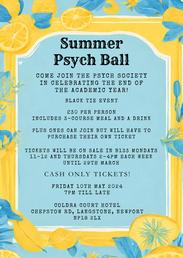


Word Search: Love & Relation ships Edition
Colouring page: Selfcare isn’t Selfish


Student Research Corner
Does Perceived Mate Value Predict Perceptions of Online Jealousy? Does Mental Health Impact the Public’s Perception Regarding Criminal Behaviour? Clowns: What makes them scary? 24-25 28-29 Meet a Postgraduate student

Hello! I’m Jordan, the Editor in Chief for your studentled magazine! I am currently studying an MSc in clinical psychology. In my spare time, I enjoy writing, spending time with friends, and gaming when I can! This year, I am also your elected Student Voice Representative - I have been continuously excited in representing students at USW!
Jordan Lewis-Iles | Editor in Chief | Studying MSc Clinical Psychology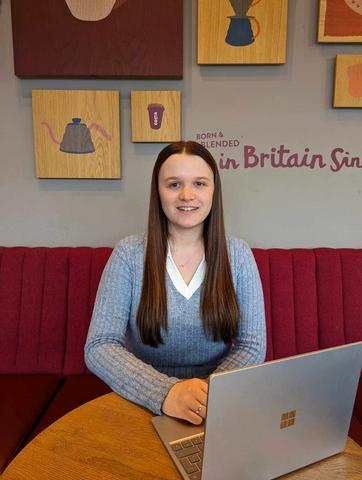
Hey, I'm Faith! I graduated BSc Hons in Psychology in 2023; I’m now studying for an MSc in Clinical Psychology parttime. I recently changed job roles, from a mental health support worker to a teaching assistant, supporting students aged 3-16. I am extremely passionate about mental health, which has influenced my degree and career choices. My hobbies vary, but mostly I enjoy going on scenic nature walks
Faith McLachlan | Second Editor in Chief | Studying MSc Clinical Psychology
"Hi, I'm Georgia! I'm 28, and returning to Uni a little later than I'd originally planned due to taking a bit longer to figure out what I wanted to do. Two of my greatest loves in life were always psychology and writing, so to be able to combine the two here is something that I adore! I also enjoy travelling, I am consistently curious, my hobbies change monthly, I'm a creative at heart, and I love anything new and exciting. My specific goals for my degree are too lengthy to fit in here, but they're based around enriching the lives of the neurodiverse, and to help schools and workplaces to do the same."

Hey! I’m Meg and I’m 23 years old, I study MSc Clinical Psychology. I’ve always been passionate about psychology and my goal is to become a clinical psychologist. When I’m not in university I’m either with my friends or watching Netflix but 90% of the time you’ll find me at a coffee shop :)
Meg Simms | Student Writer | Studying MSc Clinical Psychology
Hi! I'm Akshita R, a 21-year-old MSc Clinical Psychology student from Mumbai, India. Though I was raised in Mumbai, my family roots lay in the verdant Kerala, in the south of India. I am passionate about writing and clinical psychology. I enjoy reading and playing guitar, and I am a classically trained Bharatnatyam dancer (please don't ask me to dance). I also like to analyse psychological thriller movies in my leisure time.
Akshita, R | Student Writer | Studying MSc Clinical Psychology
Hello! I'm Hooriya, a 25-year-old originally from the vibrant city of Dubai, now embracing life in the UK. My journey is fuelled by a deep passion for mental health advocacy and psychology, which led me to pursue a degree in MSc Clinical Psychology.
Outside academia, I'm a self-taught makeup artist, avid fitness devotee, and shutterbug, seeking solace in the great outdoors whenever possible. Known among family and friends as their trusted confidante, I thrive on being the go-to advisor in their lives.
Hooriya Rais | Student Writer | Studying MSc Clinical Psychology
Hi, I'm Em! I'm a Psychology student who is very interested in the romance and attraction side of life. I'm fascinated by the idea that we see other humans as lesser than, or more than based on the way are aesthetically. Especially when we're all going to end up the same way eventually. I'm also intrigued by the idea of love, how we perceive it and experience it, and how this may vary from person to person. Outside of Psychology, I enjoy cinema, music, and yoga.
Emmy Steadman | Student Writer | Studying Bsc Psych with Criminology & Crim justice
Hi, I’m Bethan, 23, studying for my MSc in Clinical Psychology. My dissertation this year investigates the relationship between Mate Value and Jealousy in relationships. I hope you find the article interesting.
Bethan White | Student Writer | Studying MSc Clinical Psychology
Psychology has always been an interest from a young age. My interest in ‘helping people’ only grew stronger the older I got and I luckily found Psychology at A level during college. I knew then that this was something I wanted my career to be focused on!
Read more about my story on pages 22-23.
Holly Driscoll | Guest Writer | Family Support Practitioner




Experiencing mental health struggles is unfortunately increasingly common with recent statistics, stating that 1 in 4 people will experience a mental health difficulty each year. This highlights the importance of knowing how to support your loved ones effectively, and how to look after yourself. It can be difficult to know the best approach when supporting a loved one. Below is some guidance on how you can support your partner effectively.
You may have noticed a change in your partner's demeanour, or some out-ofcharacter behaviours that are a cause for concern. Although this can be a difficult task, it’s important that you communicate your worries to your partner. It not only shows the extent to which you care for them, but it also shows you are willing to help them Mental health can be a lonely

Opening up about mental health can be a very vulnerable task. Therefore, it’s good to acknowledge this and to reassure your partner of any insecurities they may have. People struggling with mental health will not often reach out through fear of burdening their loved ones.
So, reassuring them that you are there to support and listen to them when they need to talk can help alleviate this worry. It can also help increase the trust in your relationship as it encourages openness, honesty and communication.

Listening well can help build trust between you and your partner When discussing mental health, it’s important to actively listen to the individual and ask open-ended questions An openended questions means not jumping to conclusions with your own ideas about how they may be feeling or what has caused their distress. For example, instead of asking “Have you had a bad week?” try “What’s been going on for you this week?”. Providing this openminded approach allows them to reflect and talk openly without feeling the need to steer the conversation in a certain way and isolated place, so opening a conversation and offering support can be a vital step in supporting your partner.
Experiencing mental health struggles can be extremely exhausting and it is common to lose motivation for daily tasks. Small tasks can build up and become overwhelming to try and tackle without support Little acts of kindness such as offering to do the shopping, helping them tidy their room, or to organise their week can help. You’ll know your partner best and what is important to them, so you can tailor it to suit their needs. This can help them feel less overloaded with things and help them concentrate on their wellbeing.
Spending a lot of your time focusing on someone else can make you feel as if you have little time for yourself. However, looking after your well-being is important for yourself and your partner. Here are some tips to look after your well-being.
Research shows that caring for ourselves allows us to better care for others. Although it’s easier said than done to take breaks, they are needed to take care of your own well-being. You may not be able to take breaks whenever you need one, but it is important to make some time for yourself. This can be taking an hour or two to clear your head, or a day to yourself where you can relax and do something you enjoy This can help you feel more rested and help prevent burnout. If possible, try to plan regular breaks into your weekly/daily routines
This can give you something to look forward to, and ensure your partner knows what to expect.
Having meaningful conversations with friends and loved ones can help you feel more grounded and connected to those around you. This includes sharing your emotions and stresses, as watching a loved one go through a difficult time can be very distressing. It’s also important to talk about things that you are passionate about and that excite you! It may not always be appropriate or possible to share positive things with your partner - especially if they are struggling that day. So, it's valuable to find space to share these things with others.
We can often overlook our needs when supporting others but it’s vital you seek help when needed It can be overwhelming to support someone else, especially if you are doing this alone. Do not hesitate to ask for support where needed. Asking friends or family members to help out can be a useful step in taking the load off yourself and help you better manage the situation. If you need help with your mental health, you might consider about visiting the GP or seeking support from mental health services.

In the world of creative writing, love is often portrayed as a poetic and romantic notion, far removed from the realm of chemicals and science. However, considering the profound impact this powerful emotion has on our lives, delving into how it affects the human mind and body can be a fascinating exploration. Although this may not be at the top of everyone’s list, evolutionary theory suggests that the drive behind love and romance is deeply rooted in our biological need to reproduce It's thought that our attraction to certain individuals is based on their potential to pass on qualities indicating good health, fertility, and the ability to raise healthy offspring. In response to this primal urge for reproduction, our brains release a cocktail of chemicals and neurotransmitters when we encounter someone we deem as an ideal mate. One such chemical is phenylethylamine (PEA), a natural amphetamine that triggers a cascade of feel good hormones and excitement, leaving us craving for more But how does PEA work?


Triggers the release of dopamine
This neurotransmitter is a crucial part of the process as it is associated with pleasure and reward. Romantic attraction and excitement can heighten levels of dopamine release, leading to positive emotional responses and motivation to seek out further related experiences. Within romance, it is suggested that it’s what establishes the initial addiction to a person. The more attracted we are to a person, the more dopamine floods our brain, leading to obsessive thoughts and an almost euphoric longing for their presence. Studies also suggest that love’s addictive nature can be likened to substances such as cocaine and nicotine; both of which also trigger dopamine release within the brain.
GEORGIA FLATMAN FEATUREDWRITERTriggers release of norepinephrine/noradrenaline
The neurotransmitter responsible for that butterfly feeling in the pit of the stomach, norepinephrine is there to instigate excitement and desire. You can hold this one accountable for the sweaty palms, racing heart, and for your words coming out a little backwards when you finally pluck up the courage to speak to the person you’ve been thinking about for weeks.
Serotonin is often associated with the regulation of moods and emotions; however, it has a couple of different roles within the realm of love. It is known to increase in response to receiving admiration and affection from a desired person, which is thought to encourage further seeking of social status within survival.
In the context of falling in love, as serotonin levels drop, they can often aid further commitment to a partner due to heightened obsessive thinking and attachment. For example, those with obsessive-compulsive disorder are often treated with SSRIs in order to increase their serotonin levels, to lessen obsessive thoughts.
Endorphins are the body’s natural pain killers, and also heighten feelings of pleasure and euphoria. This plays a part in why we respond positively towards spending time with the person that holds our admiration.
While the exact relationship between PEA and Oxycontin is not fully understood within science, both are crucial during the bonding stages of love Oxytocin, often referred to as “the love hormone,” is a neurotransmitter that is released into the bloodstream to positively influence social interactions and emotions. It plays a vital role in forming and maintaining social bonds, as well as other functions such as increasing pain tolerance and reducing stress Interestingly, it is also heavily involved in childbirth and breast feeding, aiding evolutionary theory regarding love further. Humans often naturally seek further Oxytocin due to its feel-good properties and natural enhancement of body and mental functions, including through activities such as romance and physical intimacy.
In conclusion, the obsession with love is deeply ingrained in our biology. The brain is wired to seek what promotes survival, happiness, and better health, so it is no wonder why positive experiences of love, romantic or otherwise, can significantly enhance our overall well-being. Within the complex dance of love, the brain seems to play out a powerful journey, and it also helps us to understand why heartbreak can play out as a physical sensation as much as an emotional one. The science of it is also a reminder that emotions are not simply abstract concepts and are instead deeply rooted within intricate body experiences So, whether you’re experiencing the thrill of a new romance, or the comforting warmth of a long-term partnership, the chemistry at play is bound to bring some interesting brain activity along the way






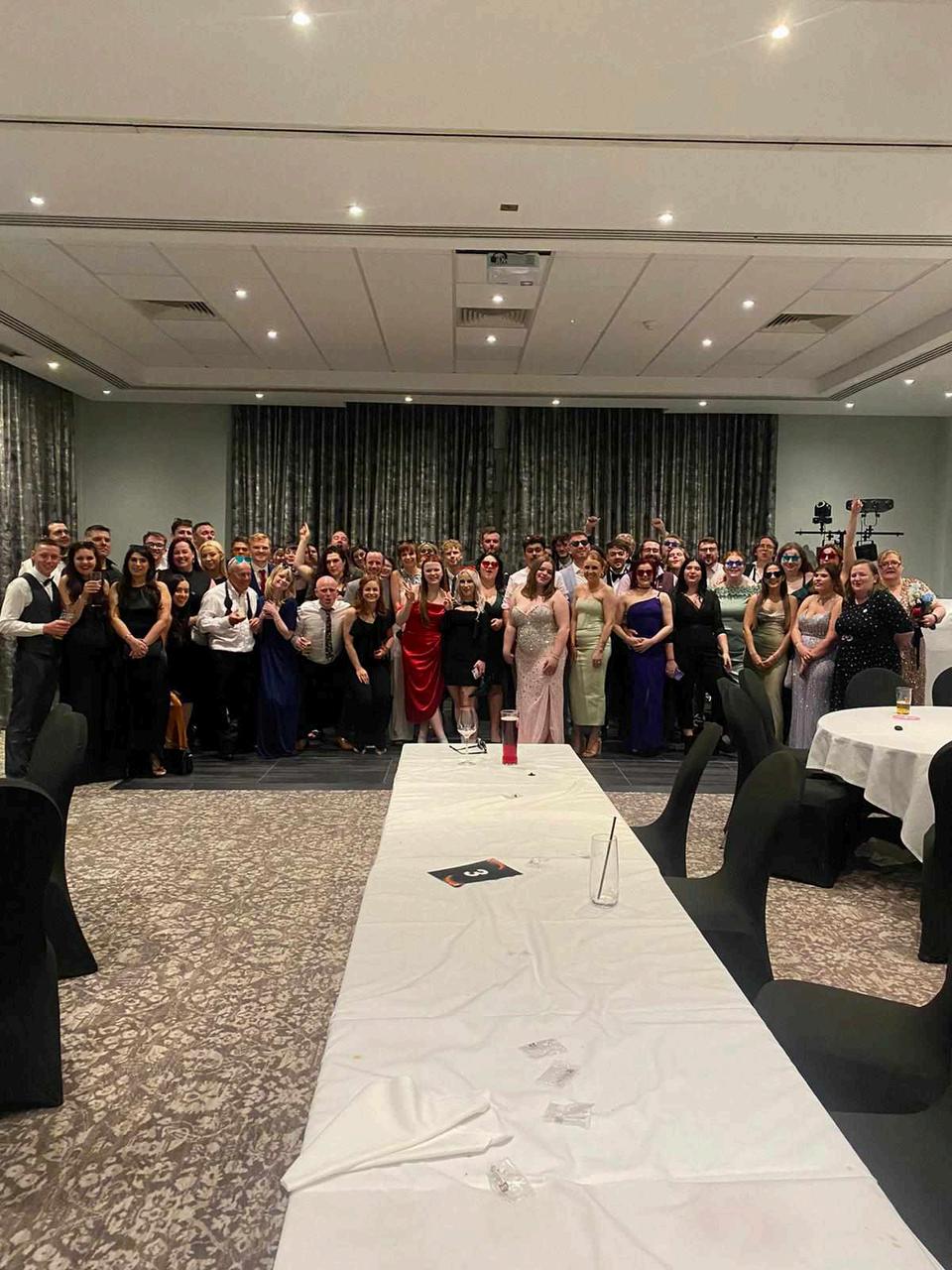


Every year, the Students’ Union organises and hosts the Student Choice Awards, an opportunity to celebrate the staff and students/apprentices who have gone above and beyond in their work, voluntary roles or their everyday life.
You can nominate as many (or as few) deserving recipients. All submissions are anonymised before judging panels get to see them, so they are judged solely on the strength of the nomination(s), rather than who is nominated or how many nominations each individual receives. University Staff can also nominate but for Student category awards only.
Shortlisted candidates (which have already been announced) have been invited to attend the Student Choice Awards presentation evening, which takes place on 23rd May 2024, in the Students’ Union building, Treforest campus. wwwuswsucom
visit www.uswsu.com for more information about the Student Choice Awards
Do not forget to meet your newly elected 2024/2025 officer team on the USWSU website. Also, keep your eyes peeled for information for the by elections results Don’t hesitate to reach out for more information about your student leaders Do you have what it takes to represent your peers..?
www.uswsu.com


1. Communicate your needs
When it comes to one of the ten elements required in a healthy relationship, effective communication is the cornerstone of a healthy relationship Being open and honest with your partner, expressing your thoughts and feelings in a constructive way, and actively listening to their perspective are all equally important. Some skills to use are: Practising active listening, using “I” statements instead of “you” statements and avoiding criticism, defensiveness, or stonewalling.
2. Put in efforts to know your partner
Reflect on who your partner truly is and what brings them excitement, both physically and emotionally. It's common to focus on our assumptions of their desires instead of truly understanding what resonates with them. Remember, if something is important to your partner, it doesn't have to make sense to you – your effort matters most Approach getting to know them with the same enthusiasm as when you first met

3. Create weekly rituals to keep each other closer.
It can be anything from buying them a flower or planning a date once a week. On a budget and can’t go big? While it might be hard to go out every week in terms of finances, don’t let that stop you. Pick a movie on Netflix and fix up some popcorn and small snacks! No gesture is ever too small, it’s the thought that counts. Let them know you’re thinking of them
4. Encourage intimacy
Whether it's physical or emotional, intimacy holds significant value in relationships Each person has distinct needs, and it's natural for couples to have variations in this aspect
To foster physical intimacy, you can create opportunities. For instance, preparing dinner in advance for your partner's return home can ease their workload. On an emotional level, intimacy can be nurtured through engaging conversations or games. Asking hypothetical "what if" or "would you rather" questions can offer a playful avenue for delving into deeper thoughts and feelings
5. Take a ‘fight break’ when you need it
While conflicts are inevitable, remember to be thoughtful in your approach and be kind to your partner and yourself If it works for you relationship, let them know you need a little time to think. However, it’s important to consider how the other person might feel about taking or giving space. Discovering your attachment styles is a great way to explore your relationship and what might work for you specifically!
6. Dig deep to unearth your feelings
In the heat of disagreements, it's common to communicate from the surface, airing out frustrations like anger or annoyance
But here's the thing: leading with these emotions often just muddles the conversation, sparking defensiveness and veering away from the real issue. Instead, try diving a bit deeper Tap into those underlying feelings of disappointment, rejection, loneliness, or disrespect – what I like to call the "bottom layer " Sharing from this space brings instant empathy because it requires honesty and vulnerability And guess what? It can magically ease tension and pave the way for actual solutions. Just remember to stay kind when you express these deeper feelings. Swap out the "You're such a jerk" vibes for something more like, "I felt hurt when..."Trust me, it makes all the difference.
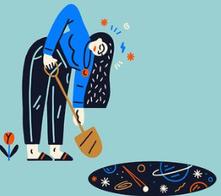
7. Be a cheerleader!
Offer support and always encourage your partner. This can be a huge source of motivation at work, play or study It also shows them that you support them and care about their achievements.
8. Accept your partner for who they are. Avoid attempting to mould your partner into someone they're not or imposing unrealistic expectations on them The more you strive to shape them to fit a certain mould, the greater the risk of them feeling unable to authentically be themselves around you, potentially breeding resentment over time
9. Maintain yourself

It’s easy to become comfortable in a relationship and let yourself go a little. Although your partner loves you for who you are, it is important to keep oneself fit and healthy both physically & mentally, to keep clean, smell good, groom yourself and dress up occasionally.

10. Vital: Do not stay in an unhealthy relationship!
I know it’s pretty tempting to stay in delulu, but if you find that you’ve tried everything from top tips to therapy and still seem to feel miserable and unhappy in a relationship, it might be time to let it go. Some things are best not forced. Know that there are exciting times ahead and you will find the person meant for you at your own pace. Nothing is more important than prioritising your mental wellbeing.

We’ve almost all had situations where we’ve become infatuated with someone, whether they’re someone we barely speak to, or someone with whom we have an on and off romantic relationship but are left wishing it was more. This article talks about the possible reasons why we have these connections, non-reciprocated desire, and why we need to look after ourselves and see things as they really are.
 EMMY STEADMAN STUDENTWRITER
EMMY STEADMAN STUDENTWRITER
We’ve almost all had situations where we’ve become infatuated with someone, whether they’re someone we barely speak to, or someone with whom we have an on and off romantic relationship but are left wishing it was more This article talks about the possible reasons why we have these connections, non-reciprocated desire, and why we need to look after ourselves and see things as they really are.
Whether this is limerence, which is a state of involuntary obsession with another person, or just a good oldfashioned crush, it may be exciting but can often end up in disappointment and upset when things don’t go our way.
We’ve all heard of the thrill of the chase, which is essentially where you find the journey of obtaining something, far more exciting than the destination. Looking at this in the romantic context, it’s exactly the same When we partake in ‘chasing’ someone, the stage where they’re not quite ours, and we’re left in the dark, it feels exciting, although painful?

Well… you may have fallen victim to fantasy bonding (Psych Alive, 2009).
Fantasy bondingis a concept put forward by Dr. Robert Firestone and occurs when you have a delusional idea of a relationship, where you perhaps fixate on someone, and constantly fantasise about an ideal version of this person. It’s essentially when you create this beautiful, perfect imagined image of someone Fantasy bonding is a defence mechanism, which we have possibly developed in our childhood as a way of keeping up an illusion of security and sanctuary at times where we felt scared or overwhelmed. You may find yourself thinking about the subject of your romantic attention very often and have this imagined life with them playing a huge part, when this may not be the case. This is normal but can result in disappointment
Fantasy Bonding possibly means that you’re probably going to be inclined to place this person on a pedestal. It’s natural, we all do it, but it’s not good for our self-esteem.
This may be a huge factor in this phenomenon, maybe they’re not asking you out, putting in the effort you deserve, or making you feel like a million dollars It may be that they’re just not right for you.
This is a hard pill to swallow, but with a lot of self-care, and meeting other potential romantic interests, you’ll slowly but surely start to see things without rose tinted glasses.
How Can We Stop?
Now, it’s all well and good realising we are experiencing a fantasy bond, and why this could be; but lets have a talk about how you can try to overcome this.
Yes, it’s not the end of the world, but without it, you’ll avoid a lot of potential dissatisfaction and disappointment, whilst also being able to see your life for how it actually is.
Ensure you’re in touch with your emotions, and true feelings, accept them, but also try your best to see things how they actually are. Be in touch with your actual self. You’ll need to face up to the sadness, but know it’s most likely for the better (G. Gibson; 2019)
Try to identify why you developed this, why you became attached to begin with, and try and work from there. This is an attachment after all, try to understand why you feel like you need it.(N. Williams; 2023)
Try to move on without closure and let yourself develop healthy attachments elsewhere It would be really great if you could be content with yourself, and your life without this bond. (N. DG; 2022)
We accept the love we think we deserveChbosky (1999)
 Akshita, R Student Writer
Akshita, R Student Writer
When we think of love, due to the heavy influence of media and the explosion of brain chemicals associated with it, romantic love tends to crush (pun intended) the discussion. In the process, a more subtle, yet pure form of love tends to be overlooked - Platonic love - which oftentimes is regarded as an essential foundation to romantic love.
While the terms seem quite intertwined, ‘friendship’ is slightly different from ‘Platonic love’ The term ‘Platonic love’ kindled from the Greek philosopher Plato, who defined it as something that has the potential to draw individuals nearer to a transcendent or divine ideal. It is a form of love that transcended the physical and included a profound, non-romantic connection at the level of the soul In Plato's philosophy, Platonic love involved a higher, intellectual and spiritual bond that sought the wellbeing and personal development of the individuals involved.
The modern definition of the term is not too far from Plato’s philosophy, focusing on the idea of intimacy without romantic or sexual desire.

It implies finding a soulmate in a meaningful friendship, wherein you feel aligned with someone who has your complete confidence, trust and loyalty. Thus, “Platonic love” goes an extra mile beyond “friendship”.
Psychology acknowledges the significance of these deep, soulmateequivalent friendships. Positive psychology conceptualises happiness or psychological well-being into two elements that took root in Greek philosophy: Hedonism and Eudaimonism.
A study explored these ideas of happiness that originated in the teachings of Aristotle, a student of Plato, and specifically explored his ideas about friendship. These ideas include utility (helping each other), pleasure (enjoying each other's company), and virtue (having good qualities)

The study unveiled that friends who provide help (utility) indirectly contribute to feeling good (hedonic wellbeing), while friends with virtuous qualities have an indirect impact on a more meaningful life (eudaimonic wellbeing). In all, the grand mosaic of Platonic relationships play unique roles in happiness and overall well-being.
Research has consistently shown that healthy and fulfilling friendships are the quintessential potion to achieving the sustained highs of good health, longevity, and long-term happiness. While Platonic relationships have their obvious emotional benefits such as having a social support system that lends an ear to your non-stop rants about your ex, improving resilience to the hurdles in the game of life, providing advice, aid and validation when you need it, there are quite a few physical benefits as well. Platonic love has shown to improve immunity, lower your risk for disease, depression and anxiety, and lower your stress levels Who wouldn't agree that a drink with friends, accompanying bar snacks called deep conversation and laughter has the power to make all your worries vanish?
Proximity plays a crucial role too in this mix of ingredients contributing to longterm happiness A multi-generational Harvard study broke down the step-bystep recipe for happiness, which is apparently contagious If a friend who lives within a mile of you becomes happy, it increases the probability of you being happy by 25%.
But get this, the further your friend lives and the longer they stay away, the less happy their happiness makes you.
While proximity is important, so is a sense of autonomy It is said that friends should not be roommates, the consequence of this would be that you would end up at each other’s throats by the end of the day
Ideally then, one must find the sweet spot between being close, yet far. Perhaps then my advice would be that you could have a cute little house for yourself and your family, with your friends enjoying their own delightful residences right beside. This way, both parties get privacy, independence and the heavenly blessing of a deep, meaningful and pure connection right next door. This concoction might just be the secret elixir to long-lasting happiness, good health and longevity
So maybe get on one knee and tell your friends that you want to spend the rest of your life with them They might even say yes!
All in all, Platonic love stands as the quiet medicine with its myriad emotional and physical benefits in finding a fulfilling human connection. Platonic love brings with it a deep connection that is nonsexual, yet brimming with intimacy



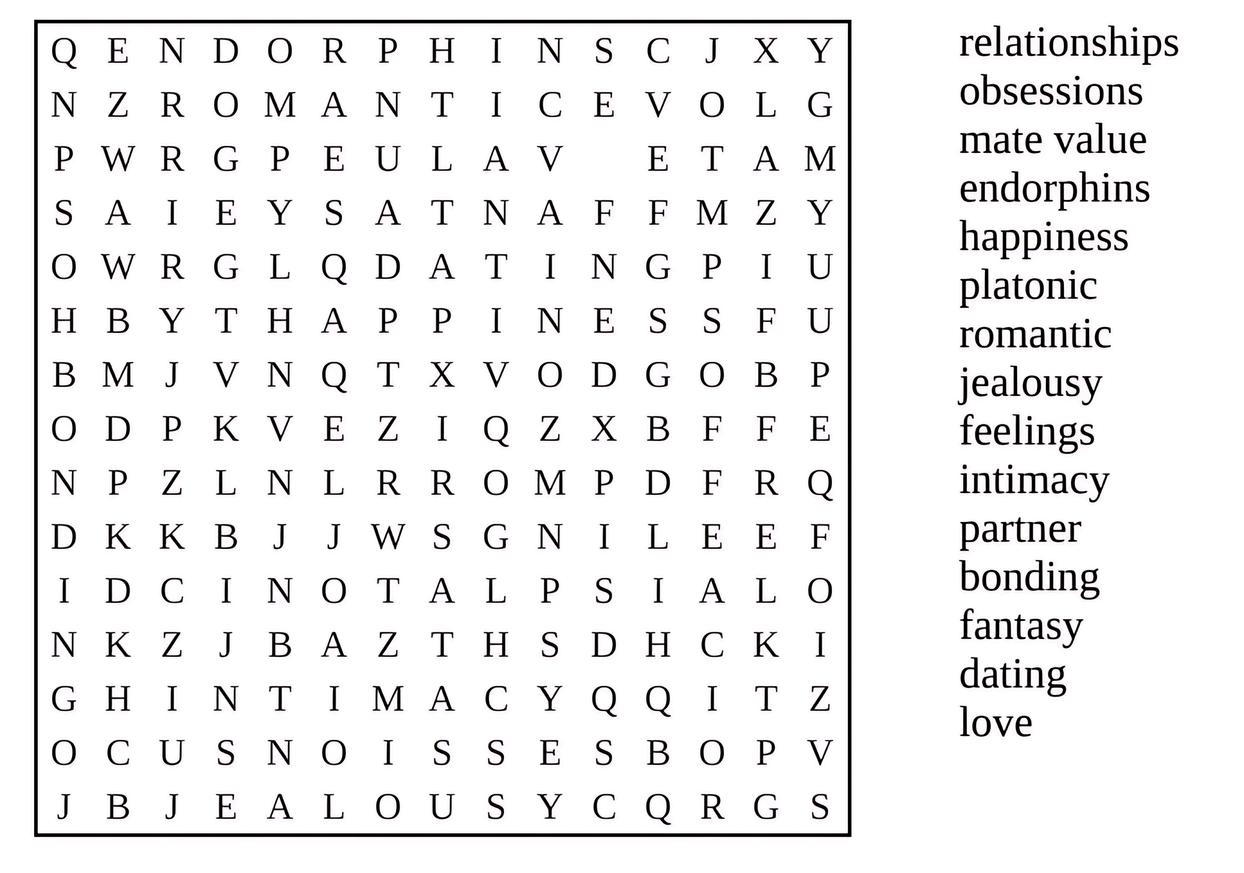

 HOLLYDRISCOLL GUESTWRITER
HOLLYDRISCOLL GUESTWRITER
What Course did you study, and at what university?
I studied BSc Psychology at USW graduating in 2020, then completed my MSc Clinical Psychology degree at USW in 2021, and I have recently passed my VIVA examination for my Masters by Research with USW focusing on engaging elderly residents in social activity post COVID
Why choose psychology and those particular courses?
For me, psychology has always been an interest from a young age My interest in ‘helping people’ only grew stronger the older I got and I luckily found Psychology at A level during college I knew then that this was something I wanted my career to be focused on!
I chose BSc psychology (with no extra counselling etc) as I wasn’t sure what area of psychology I like most (if I’m honest I still don’t, I like them all!).

The clinical masters degree stood out to me as Dr Deborah Lancastle was completing research on menstruation and psychology, and my final masters degree which I’m finalising currently happened to come up as I was finishing my original masters degree and I thought, why not have two!?
When you first graduated what did you hope to do after?
When I first graduated, I think the reason why I jumped into my Masters in clinical psychology was because I didn’t feel 100% ready to choose a pathway of psychology. After graduating MSc Clinical Psychology I knew I wanted to do more but I wasn’t sure of what pathways were available I knew I wanted to do some form of working with people in the community after my volunteering experience with Elevate Coaching and Mentoring
What did you actually end up doing after graduation?
After my undergraduate graduation I secured a job in Llamau as a support worker for Homeless women and children I stayed there for 3 years and gained lots of first hand experience I was able to work part time or full time alongside studying so I had a lot of experience in between my jobs After my MSc Clinical graduation I landed a job in Action for Children as a family support practitioner which is my current job role I provide family therapy to families and young people in the community
In addition my MSc Clinical dissertation contributed to a research paper by Dr Deborah Lancastle which was published in 2023, having my name on research was extremely rewarding I am hopefully going to be publishing my current research in association with Linc Housing once my amendments are complete on my thesis!
Do you have any advice for our readers?
Stay strong! University is difficult but if you can find something you truly enjoy, don’t give up! Use your community of people around you, do late night library study dates with friends and try not to live off pasta and cheese! You got this!
 HOLLYDRISCOLL FAMILYSUPPORTPRACTITIONER
HOLLYDRISCOLL FAMILYSUPPORTPRACTITIONER

Want to share your story?
Contact Sulci (First Page).
 BETHAN WHITE STUDENT WRITER
BETHAN WHITE STUDENT WRITER
To give an overview, I am writing my Masters’ dissertation on whether we can predict perceptions of jealousy from measures of a person ’ s perceived mate value. In addition to this I intend to investigate the same question using a test of perceptions of online jealousy.
Mate value is a concept which is related to romantic attraction and evolutionary psychology. Many studies have investigated the sexual tactics used by men and women, as well as their preferences for long-term and shortterm partners (Edlund & Sagarin, 2014) Most research has emphasised the differences between men and women, including mate selection criteria, mate retention strategies, and responses to infidelity (Salkičević et al., 2014). A smaller number of studies have concentrated on the shared characteristics between the sexes, for example reasons for divorce. Mate value is important to our understanding of assortative mating, which is based on the idea of mate worth or value (Gangestad & Simpson, 2000). It describes individuals’ tendencies to stay in committed relationships with those of a similar mate value. Therefore, it is possible that perceived mate value could predict differences in perceptions of jealousy in relationships
Feelings of jealousy are experienced in response to a threat to, or the actual loss of relationship with another person, due to an actual or imagined rival for one's partner's attention (Dijkstra & Buunk, 1998). Therefore, I am aiming to investigate whether perceived mate value influences perceptions of different types of jealousy, by asking participants about their perceptions of jealousy in different scenarios.
Furthermore, I am predicting that gender and age may also play a role. Dijkstra and Buunk (1998) suggested that jealousy is evoked by the characteristics of the rival that are believed to be important to the other sex. Their study found that jealousy in males was influenced by the rival's dominance, whereas jealousy in females would be influenced more by the rival's physical attractiveness. Further suggesting men and women are motivated to experience jealousy in different ways
Miner et al (2009) also found that the mate value of romantic partners predicted men’s partner-directed verbal insults. Consequently, we may ask whether mate value can also predict jealousy outcomes between the sexes.
In a study by Shackelford et al. (2004), romantic jealousy was investigated in both older and younger participants. The study found that younger men were more distressed by sexual infidelity, whilst women were more distressed by emotional infidelity. The sex difference was replicated in the older group also, where age was found to play a lesser role.
In terms of age and mate value, Brase and Guy (2004) found that mate value declined with age for females, but increased with age for males and also that mate value tended to be higher for married people Similar findings were replicated by Arnocky et al. (2015) who found that younger men and women, who were lower in important mate value characteristics, such as health, to exhibit more romantic jealousy
Much of the literature cited here seems quite dated, which has led me question whether any research had considered more up to date technology and online jealousy, which is what is unique about my own research, as it questions whether the same effects occur when the perceived threat is not physical?

This is important as social media users worldwide has surpassed 3 billion (Statista, 2019) Such platforms have also been praised for their potential to benefit relationships (Daspe et al., 2018), but do they provide a channel for romantic jealousy?
According to Mileham (2007) the ease of access to the internet has made it easier for people to enjoy both the stability of a committed partnered relationship and the potential to engage in infidelity at the same time. The question lies with whether the potential for jealousy is increased by knowledge of the capabilities for infidelity online.
This leads on to the research I intend to carry out Participants will be provided with the mate value scale (Fisher et al., 2008) which will determine their perceptions of their mate value Next, participants will give their judgements of perceptions of different types of jealousy in various third-party scenarios Finally, participants will complete the adapted Digital Jealousy Scale (Gubler et al., 2023) where they will be presented with scenarios about online jealousy situations.
Overall, this research aims to investigate whether perceived mate value affects perceptions of jealousy scenarios described in online and offline situations It also aims to explore whether gender and age make a difference. Previous research has shown that mate value predicts jealousy, but does the same effect exist for online jealousy?
If you wish to take part in this study, then please scan this QR code:
The fear of clowns, known as coulrophobia, has been a mystery within the field of phobias for some time now. Clowns are supposed to be performing figures, providing entertainment to audiences, so why do some find them so fearful?
Despite the high prevalence of the fear of clowns around the world, the fear is yet to be added to the DSM as a phobia, however, coulrophobia could be accommodated in the DSM within “specific phobias” under “costumed characters”, as suggested by Dr Phillip Tyson There are a few theories out there that aim to explain the reasons for this unusual fear, such as the uncanny effect, learned fear through the media and personal experiences, or a concomitant towards illness or contagion
Previous literature and postulation from researchers have suggested that such fear could potentially be elicited specifically from clown face paint features.
It is suggested that, compared to other face paint variations, the combination of the white and red paint may elicit the most fear. This is based on the idea that the white face paint may resemble the appearance of a deceased body or illness, while the redness may also resemble illness or contagion.

 JORDAN LEWIS-ILES Student Writer
JORDAN LEWIS-ILES Student Writer
This student psychology dissertation at USW, conducted in 2024, aimed to investigate different variations of clown face paint and how individuals react to them. The purpose of this study is to better understand the fear of clowns, and why some people find clowns so scary, or just generally why they can be uneasy to look at
As stated, the aetiological characteristics of clowning (white and red makeup) has been suggested to have a resemblance of sickness and contagion, although no evidence was found within the literature to support this idea In this study, face paint colour combinations were exposed to participants to measure how much fear each variation elicited It was hypothesised that the red and white combinations would elicit the most fear compared to other colour variations.

To maintain low risk ethics, anyone under the age of 18 years were not able to participate in this study. 69 participants in total participated in this study, of an age range of 18 and 72 years old. The majority of participants had low to no fear of clowns, as indicated by the Fear of Clowns Questionnaire (FCQ), which everyone filled out before being exposed to the study materials.
This study was designed as a 2x2 repeated measures ANOVA, which made it possible to measure several categorised variables to explore any interactions between the effects of the DVs This allowed the researcher to manipulate the IVs (variations of face paint) to determine if there are any interactions with the DV (level of fear). IVs included variations of, white/red, white/blue, natural/red, natural/blue (natural referring to normal skin tone)
The results in this study revealed that clowns that wore white face paint that covers their entire face (no human skin visible), were significantly percived as more scarier compared to the other face paint combinations The combination of the white face paint with the red paint around the mouth and nose elicited the most fear as hypothesised, however this specific combinations of face paint was not significant
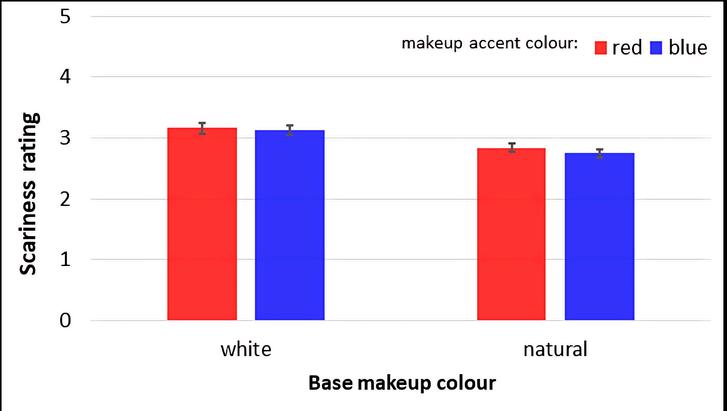
This study aimed to investigate different variations of clown face paints and how they elicit such fear. Clowns that wore a full face of white makeup elicited the most fear in this study. This finding may further support the idea that this image may resemble a dead body or illness, explained better as a fear of contagion. This reasoning comes from the basis of aetiological responses - it is natural to feel repulsed by death, illness, and contagion, especially when figures are potentially appearing that way. This specific image may also elicit uncertain emotions stemming from the uncanny valley effect phenomenon, because the entirety of the face is covered.
One limitation of this study is that a large majority of participants did not have a fear of clowns Although this was expected, individuals without a fear of clowns reported that they found some images uneasy, creepy, or scary, which was somewhat revealing.
This academic year, the investigation in to the nature of coulrophobia will continue to be investigated. This year, the study will aim to investigate the appropriateness of costumed characters (clowns, puppets, dolls, drag queens, etc), for children's entertainment.
This young demographic is being investigated in hopes that young people will not have been exposed to the media of “killer clowns”, horror films such as IT, and other negative images that clowns may have portrayed. Right now a hypothesis has not been formulated, however, if children continue to fear clowns like a lot of adults, maybe the media and horror is not to blame for this fear
Various members of the public in today’s society can often have a stereotyped perception regarding mental health and criminal behaviour. The popular belief in the United States is that individuals with mental health illnesses are more likely to commit acts of violence and aggression, therefore a large selection of the public view these individuals as dangerous. In relation to this, a research study had been conducted in order to investigate whether the United Kingdom’s population have an identical outcome.
Mental health illnesses exist within a complex continuum, which means each person experiences it differently, therefore the levels of difficulty and stress vary depending on the severity level Therefore, this causes the clinical outcomes to differ between individuals who suffer with mental health illnesses. Following on from this, a crime is a deliberate act which can result in physical or psychological harm, damage to or loss of property, and anything that is against the law

 MEGANSIMMS STUDENTWRITER
MEGANSIMMS STUDENTWRITER
examples of crime given from the Metropolitan Police are burglary, criminal damage, drugs, fraud and forgery, robbery, sexual offences, theft, and handling – each of these crimes are categorised in order to give a suitable charge.

A dissertation study referred to as “The Public’s Perception on the Link Between Mental Health and Crime” commenced and finished during 2023. The research study was idealised to investigate the United Kingdom’s public perception on the link between mental health and criminal behaviour and whether there is a similarity within the public’s opinions The aim of the dissertation was to explore individuals’ perceptions of mental health and criminal activity
In order to answer this aim, there were three research objectives which were 1) To find out what members of the public understand and think about the link between mental health and criminal behaviour. 2) To explore people’s opinions about how those with mental health illnesses should be treated if they commit criminal activities And 3) To explore people’s understanding of other factors that might contribute to committing criminal acts
The chosen design that was applied throughout this research project was a thematic analysis which means that the results were qualitative This design meant there that were no independent or dependent variables as the study was not focussed on measuring the hypothesis between correlational relationships. Altogether the research had involved the participation of six individuals who had an age that ranged from 18 to 75. A large gap between the participants had been purposely
chosen as each generation would have allowed the researcher to determine whether there are any similarities in opinions.The participants were specifically chosen and were approached by the researcher who asked for their possible contribution – deception did not take place and the requested individuals had the right to deny the request for recruitment immediately
Within this investigation, a wide range of opinions were collected due to the age gap between the youngest and the oldest participant, the data collected showed evident information on how sociological stereotypes differ within each generation The research had established that more than half of the participants, who are members of the public, were a lot more pessimistic in their opinion once a crime had been committed even on the basis of mental health However, they were still accepting of the fact that the perpetrator was mentally unwell. Furthermore, the other participants felt a sense of empathy on those who commit criminal acts whilst suffering with a mental illness.
More research out to be done to enhance how those who committed a criminal act with mental illness are perceived within public settings.
Do you want a change of scenery from your usual workspace? If so, why not try working from the Wellbeing Hub? This calming and quiet environment, coupled with stunning views of the surrounding nature, helps provide a perfect balance of work and relaxation. There is no restriction on the amount of time you can spend in the hub, so come along for as long as you want! Finally, the nearby Lake View cafe provides freshly made food and beverages to help fuel your work day.

Fancy a break from your work? No problem, you can place your belongings in one of the secure lockers, which are free to use, and head out! Breathe in the fresh air, and stroll along the footpath with idyllic grass and woodland and a stunning 36-acre lake. It’s the perfect setting for a well-deserved break.

Monday – Friday 09.00am – 17.00pm
Individual & Group Desks
Heater & Air Conditioning
Comfortable Office Chairs
Charging Ports
Lockers
Free Wi-Fi Beautiful View





